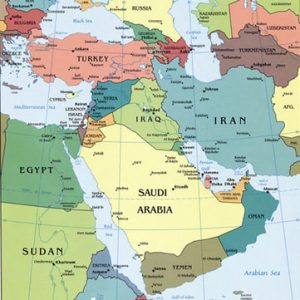The Middle East

While the “Middle East” can be thought of as Western Asia with the addition of Egypt, my focus here will be solely on Israel. As I gain more information on other countries, meaning when I’m lucky enough to travel to them, I'll be sure to add them.
Having family in Israel and having visited, I’m familiar with its unique cuisine or should I say, cuisines! Tel Aviv and Jerusalem are considered the main cultural hubs of Israel. You might be surprised to know that Israel has the highest number of museums per capita in the world (over 200!), so if you do visit, you'll never be at a loss for something to do. The heterogeneous nature of culture in Israel is also manifested in Israeli cuisine. It should come as no surprise that foods common in the Mediterranean region (e.g. olives, wheat, chickpeas, peanuts, sesame, dairy products, fish, tomatoes, eggplants, zucchini, and other vegetables and fruits) are prominent in Israeli cuisine.
Israeli eating customs also conform to the wider Mediterranean region, with lunch, rather than dinner, being the focal meal of a regular workday. “Kibbutz foods” have been adopted by many Israelis for their light evening meals as well as breakfasts, and may consist of various types of cheeses (both soft and hard), yogurt, sour cream, hummus, vegetables and salads, olives, hard-boiled eggs, omelets, pickled and smoked herring, a variety of breads, fresh orange juice, and coffee.
In addition to the dominant influence of “native” Israelis, cuisines are still influenced by immigrants from northern Europe and the former Soviet Union, Spain, Portugal, and northern Africa, who brought their own traditional foods and dishes. The dishes my own family tended to serve, clearly influenced by their German roots, tended to be heavier than the native Israeli dishes.
Jewish holy days and festivals have their own special influence on the cuisine, with the preparation of traditional foods such as jelly doughnuts (known as "sufganiyot") for Hanukah, the hamantaschen pastry (called "oznei haman") for Purim, charoset (a mixture of ground apples, walnuts, honey, wine, and cinnamon) for Passover, and dairy foods for Shavuot. But even the weekly Shabbat (sabbath) dinner, eaten on Friday after sundown, is a significant meal in Israeli homes, often a roast chicken accompanied by challah (the shiny braided egg bread)..
If you're not Jewish and you're wondering about how to ensure you're not offending Israelis, remember my advice on the main Travel page (i.e. watch the locals and try to do as they do). Also know that kosher laws strongly influence the availability of certain foods and their preparation in homes, public institutions, and many restaurants (e.g. the separation of milk and meat and avoiding the use of non-kosher foods, like pork and shellfish), so don’t for example, assume you can get a cheeseburger or a ham sandwich! It's also important to remember that during Passover (sometime in late March or early April) bread and other foods that contain yeast or other substances that can act as leavening agents are prohibited to observant Jews, matza and leaven-free foods are substituted, and many restaurants and bakeries simply close for the 8-day period, so this may affect what's available for you to choose from.